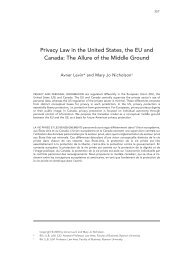Commentary on Fichte's “The Illegality of the Unauthorised ... - uoltj
Commentary on Fichte's “The Illegality of the Unauthorised ... - uoltj
Commentary on Fichte's “The Illegality of the Unauthorised ... - uoltj
You also want an ePaper? Increase the reach of your titles
YUMPU automatically turns print PDFs into web optimized ePapers that Google loves.
(2008) 5:1&2 UOLTJ 141<br />
<str<strong>on</strong>g>Commentary</str<strong>on</strong>g> <strong>on</strong> Fichte 155<br />
5.3 The Relati<strong>on</strong>ship Between Author and Publisher<br />
If <strong>the</strong> author cannot transfer <strong>the</strong> form <strong>of</strong> <strong>the</strong> book to <strong>the</strong> publisher, and if <strong>the</strong> ideas<br />
cannot be transferred without in-depth study <strong>on</strong> <strong>the</strong> part <strong>of</strong> <strong>the</strong> publisher, Fichte<br />
questi<strong>on</strong>s what <strong>the</strong> publisher gains from an agreement with <strong>the</strong> author. He does<br />
not acquire a physical object since <strong>the</strong> manuscript handed over by <strong>the</strong> author is <strong>of</strong><br />
little value. What is <strong>of</strong> value, however, is <strong>the</strong> right to use <strong>the</strong> manuscript to make<br />
available to <strong>the</strong> public <strong>the</strong> opportunity <strong>of</strong> acquiring <strong>the</strong> ideas c<strong>on</strong>tained in it. In<br />
o<strong>the</strong>r words, <strong>the</strong> publisher gains <strong>the</strong> right to <strong>the</strong> usufruct <strong>of</strong> <strong>the</strong> property <strong>of</strong> <strong>the</strong><br />
author. The publisher thus acts not <strong>on</strong> his own behalf, but <strong>on</strong> behalf <strong>of</strong> <strong>the</strong> author<br />
as her representative. 64<br />
That this is what is transferred from <strong>the</strong> author to <strong>the</strong> publisher in return<br />
for m<strong>on</strong>ey is again evident from <strong>the</strong> acti<strong>on</strong>s that are permitted and proscribed in<br />
practice. The fact that <strong>the</strong> publisher must seek <strong>the</strong> permissi<strong>on</strong> <strong>of</strong> <strong>the</strong> author to<br />
print subsequent editi<strong>on</strong>s or extend print runs attests to <strong>the</strong> fact that <strong>the</strong> c<strong>on</strong>tract<br />
between <strong>the</strong> author and <strong>the</strong> publisher does not transfer <strong>the</strong> ownership <strong>of</strong> <strong>the</strong><br />
book to <strong>the</strong> publisher, but merely gives him a license to use <strong>the</strong> book for a limited<br />
purpose. Fur<strong>the</strong>rmore, <strong>the</strong> fact that our disappointment in a poorly written book<br />
is directed towards <strong>the</strong> author and not <strong>the</strong> publisher provides additi<strong>on</strong>al pro<strong>of</strong><br />
<strong>of</strong> <strong>the</strong> c<strong>on</strong>tinuing property right <strong>of</strong> <strong>the</strong> author in <strong>the</strong> book. It is to <strong>the</strong> author that<br />
we turn for compensati<strong>on</strong> for a useless, unstimulating or unoriginal book, not to<br />
<strong>the</strong> publisher, who has no c<strong>on</strong>trol over <strong>the</strong> c<strong>on</strong>tent <strong>of</strong> <strong>the</strong> book. The deceit <strong>of</strong><br />
an inferior book is not <strong>on</strong> <strong>the</strong> part <strong>of</strong> <strong>the</strong> publisher, who is merely <strong>the</strong> author’s<br />
representative, but ra<strong>the</strong>r it is a result <strong>of</strong> <strong>the</strong> acti<strong>on</strong>s <strong>of</strong> <strong>the</strong> author. 65<br />
The illegitimate publisher <strong>of</strong> a work thus makes use <strong>of</strong> <strong>the</strong> author’s<br />
property without entering into a c<strong>on</strong>tract that sets out <strong>the</strong> terms in accordance<br />
with which <strong>the</strong> publisher represents <strong>the</strong> author. As Fichte explains, <strong>the</strong> illegitimate<br />
publisher<br />
. . . appropriates, not <strong>the</strong> property <strong>of</strong> <strong>the</strong> author, nor his ideas (this he cannot do<br />
for <strong>the</strong> most part, for if he were not ignorant, he would pursue an h<strong>on</strong>est trade),<br />
nor <strong>the</strong> form <strong>of</strong> <strong>the</strong> ideas (this he could not do, even if he were not ignorant), but<br />
ra<strong>the</strong>r <strong>the</strong> use <strong>of</strong> <strong>the</strong> property. He operates in <strong>the</strong> name <strong>of</strong> <strong>the</strong> author, without<br />
receiving instructi<strong>on</strong>s from him, and without coming to an agreement with him,<br />
and arrogates <strong>the</strong> pr<strong>of</strong>its which arise from this representati<strong>on</strong>. He acquires in this<br />
way a right to which he is not entitled, and so interferes with <strong>the</strong> author’s exercise<br />
<strong>of</strong> his exclusive right. 66<br />
Here, Fichte’s understanding <strong>of</strong> <strong>the</strong> relati<strong>on</strong>ship between author and publisher<br />
is reminiscent <strong>of</strong> Kant’s argument in his essay <strong>on</strong> reprinting. In his paper, Kant<br />
also distinguishes between <strong>the</strong> ownership <strong>of</strong> <strong>the</strong> material <strong>of</strong> <strong>the</strong> book and <strong>the</strong><br />
ownership <strong>of</strong> its intellectual aspect. However, here too, a slight difference is<br />
introduced between Kant and Fichte’s views. Fichte argues that <strong>the</strong> ownership<br />
<strong>of</strong> <strong>the</strong> intellectual aspect derives from <strong>the</strong> unique form that <strong>the</strong> author has given<br />
to <strong>the</strong> ideas that he expresses. The reprinter <strong>of</strong> a book appropriates <strong>the</strong> author’s<br />
64. Fichte, “Pro<strong>of</strong> <strong>of</strong> <strong>the</strong> <strong>Illegality</strong> <strong>of</strong> <strong>the</strong> Reproducti<strong>on</strong> <strong>of</strong> Books,” supra note 2 at para. 14.<br />
65. Fichte, “Pro<strong>of</strong> <strong>of</strong> <strong>the</strong> <strong>Illegality</strong> <strong>of</strong> <strong>the</strong> Reproducti<strong>on</strong> <strong>of</strong> Books,” supra note 2 at para. 15.<br />
66. Fichte, “Pro<strong>of</strong> <strong>of</strong> <strong>the</strong> <strong>Illegality</strong> <strong>of</strong> <strong>the</strong> Reproducti<strong>on</strong> <strong>of</strong> Books,” supra note 2 at para. 16.









